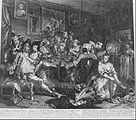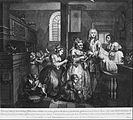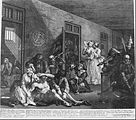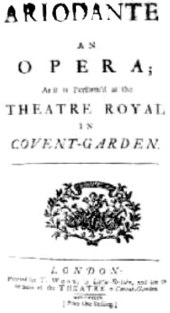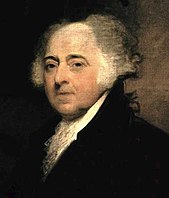1735
Portal history | Portal Biographies | Current events | Annual calendar
◄ |
17th century |
18th century
| 19th century
| ►
◄ |
1700s |
1710s |
1720s |
1730s
| 1740s
| 1750s
| 1760s
| ►
◄◄ |
◄ |
1731 |
1732 |
1733 |
1734 |
1735
| 1736
| 1737
| 1738
| 1739
| ►
| ►►
Calendar overview 1735
| 1735 | |
|---|---|
|
Sir Robert Walpole becomes the first British Prime Minister at 10 Downing Street . |
In his work Systema Naturae, Carl von Linné introduces the taxonomy in the three natural kingdoms . |
|
At Bemerode there is a big “ army show ” of the Braunschweig-Lüneburg army . |
|
| 1735 in other calendars | |
| Armenian calendar | 1183/84 (turn of the year July) |
| Ethiopian calendar | 1727/28 (turn of the year 11/12 September) |
| Bengali solar calendar | 1140/41 (beginning of April 14th or 15th) |
| Buddhist calendar | 2278/79 (southern Buddhism); 2277/78 (alternative calculation according to Buddhas Parinirvana ) |
| Chinese calendar | 73rd (74th) cycle
Year of the wooden hare乙卯 ( at the beginning of the year wooden tiger 甲寅) |
| Chula Sakarat (Siam, Myanmar) / Dai calendar (Vietnam) | 1097/98 (turn of the year April) |
| Dangun era (Korea) | 4068/69 (October 2/3) |
| Iranian calendar | 1113/14 |
| Islamic calendar | 1147/48 (turn of the year 23/24 May) |
| Jewish calendar | 5495/96 (September 16-17) |
| Coptic calendar | 1451/52 (September 11-12) |
| Malayalam calendar | 910/911 |
| Seleucid era | Babylon: 2045/46 (turn of the year April)
Syria: 2046/47 (turn of the year October) |
| Vikram Sambat (Nepalese Calendar) | 1791/92 (turn of the year April) |
Events
Politics and world events
Great Britain
- September 22nd : 10 Downing Street becomes the official residence of British Prime Ministers for the first time . Sir Robert Walpole is the first to move into the premises.
War of the Polish Succession
- Summer: Emperor Karl VI. approves the first passage of Russian troops through German territory to strengthen the threatened Neckar front against France. Previously, he rejected an offer from the Prussian King Friedrich Wilhelm I for reinforcement because of his interest in the succession rights in the Duchy of Jülich . At the imperial request, the 71-year-old Prince Eugene of Savoy returned to the front.
- September 2nd : The Imperial Army has to hand Mirandola over to the French.
- October 3 : The preliminary peace in Vienna ends the war of the Polish succession to the throne . Elector August of Saxony is confirmed as King of Poland . France's candidate Stanislaus retains the royal title and receives Lorraine and the Duchy of Bar for life, albeit under French administration. After his death, the countries will officially fall to France . Spain received Naples , Sicily and the island of Elba , but ceded Parma and Piacenza to Emperor Karl in favor of Austria . He also got back almost all possessions in Northern Italy . Duke Franz Stephan of Lorraine receives the claim to the Grand Duchy of Tuscany , since the extinction of the Medici was already foreseeable at this point in time. France also renews its recognition of the Pragmatic Sanction of 1718 . The treaty is essentially identical to the final peace, also concluded in Vienna in 1738 .
Holy Roman Empire
- March 1 : With the death of his father-in-law Ludwig Rudolf , Ferdinand Albrecht II , previously Duke of Braunschweig-Wolfenbüttel-Bevern , inherits the entire Duchy of Braunschweig-Wolfenbüttel . For this he leaves his brother Ernst Ferdinand Bevern as a Paragium . However, Ferdinand Albrecht II dies on September 13th, and his son Karl I then takes over the ducal dignity of Braunschweig-Wolfenbüttel.
- By a decree of the Prussian King Friedrich Wilhelm I , the residence obligation comes into force.
- The county of Saarbrücken is separated from the county of Nassau-Usingen again.
- At Bemerode there is a big " army show " of the Braunschweig-Lüneburg army , the review at Bemerode .
Other events in Europe
- January 17th : Alvise Pisani is elected Doge of Venice to succeed Carlo Ruzzini , who died on January 5th , probably with the help of bribes. He enjoys the reputation of a curmudgeon in Venice , but his election is celebrated over three days with lavish festivities, balls and evening fireworks, as well as generous gifts, bread and money for the people.
- The first skirmishes in the Khanate of Crimea precede the Russo-Austrian Turkish War .
South American colonies
- In the wake of the War of the Polish Succession, tensions arise between the governments of Portugal and Spain . In February, some Portuguese diplomatic representatives were arrested in Spain, whereupon Portugal sought English help in London, citing the assistance pact of 1703. England then sends a poorly equipped fleet under Admiral John Norris , which arrives in Portugal on June 9th . Its mission is not to get involved in a war against Spain under any circumstances unless Portugal is attacked directly.
- April 18 : The Spanish Foreign Minister José de Patiño y Rosales orders the Governor of Buenos Aires Miguel de Salcedo y Sierralta not to wait for a formal declaration of war, but to attack and take Colonia del Sacramento by surprise.
- July 29th : With the capture of a Portuguese merchant ship by Spanish pirates, the officially never declared Spanish-Portuguese War begins , which is almost exclusively fought in the South American colonies . On September 15th, another ship is captured by the Spaniards.
- October 20 : A Spanish force appears outside the Portuguese city of Colonia del Sacramento . A first attack on the city fails on November 5th .
- November 9th : The Spanish begin the siege of Sacramento. Attempts to storm the city failed on December 10 after a twelve-day bombardment.
North Africa and Middle East
- Ali I al-Husain succeeds his late brother Husain I ibn Ali as Bey of Tunis under formal Ottoman rule. The latter enforced the inheritance of his office for the Husainids during his reign .
- Muhammad ibn Saud becomes the first imam of the Saudi dynasty in Diriyya in southern Najd .
Empire of China
- October 8 : After the death of Yongzheng , his fourth son Hongli becomes the fourth emperor of the Qing Dynasty in China . Hongli is one of the best trained emperors in Chinese history . His father-overseen studies included humanistic education, poetry, calligraphy and painting, showing himself talented in all areas. Besides Chinese and Manchurian, he also speaks Mongolian, Uighur and Tibetan. The prince has often acted as regent in the absence of his father and was involved in political decisions by him. Hongli ascends the Chinese throne under the era name Qianlong . As a first measure, the new emperor decides to dismiss all members of the imperial clan from important offices. Qianlong deeply distrusts his extended relatives and fears factional conflicts within the court such as those that occurred during his grandfather's final years in office. Even his brothers and cousins, who were brought up with him at the palace school, do not trust him. The princes are consistently excluded from the government.
economy
- February 13th : Abraham Vandenhoeck founds the Vandenhoeck publishing house in Göttingen in cooperation with the Göttingen University founded in the previous year .
- June 25 : Great Britain enacts the Engraver's Act , the second copyright law in the world that extends the Statute of Anne to include copperplate engravings , but primarily protects authors rather than publishers. The driving force behind the law is the engraver William Hogarth . In its original form, the law only protects engravers who also created the model of the engraving. This does not protect artists who copy existing works of art.
- The Swiss watch manufacturer Blancpain is founded.
- It is proven that pumpkin seed oil is produced in Styria for the first time .
science and technology
- January 26th : The Commerzbibliothek is founded in Hamburg by members of the Commerzdeputation . The basic idea of this publicly accessible library is to expand the knowledge of Hamburg merchants and to enable comprehensive training and further education.
- Carl Linnaeus into his work Systema Naturae , the taxonomy a (systematics in biology). In it, Linné classifies the " natural kingdoms " animals , plants and minerals on seven double sheets by means of the five consecutive ranks of class , order , genus , species and variety . The work begins with the general observations on the three kingdoms of nature dated July 23rd . Another sheet shows a key to his plant sexual system .
- The British ironmaster Abraham Darby II replaced in the iron ore smelting of charcoal by coke .
- The French surgeon Claudius Amyand performs the first successful appendix operation at St. George's Hospital in London .
- King Charles III von Hungary founds a mining school in Selmecbánya , from which the West Hungarian University will develop.
Culture
Visual arts
- After June 25th: After the Engraver's Act, William Hogarth publishes his eight-part copperplate series A Rake's Progress, which was created the previous year .
- William Hogarth founds the painting and drawing school St. Martin's Lane Academy with some friends from London .
- The Kungliga Konsthögskolan Stockholm is founded.
Music and theater
Hamburg
- Georg Philipp Telemann publishes twelve compositions under the title Fantaisies pour la Basse de Violle in his own publishing house in Hamburg .
Leipzig
- January 1st : On New Year's Day, Part IV of Johann Sebastian Bach's Christmas Oratorio will be premiered by the St. Thomas Choir in Leipzig, including the cantata Let us take care, let us wake up .
- January 2nd : Part V of the Christmas Oratorio has its world premiere . Among other things, it contains the aria Enlighten my dark senses , the only piece in the oratorio that is not accompanied by the continuo . The composition is a deeper parody of Bach's secular Bourrée -Arie, Through the weapons from the cantata prices your luck, blessed Saxony from the previous year, inflamed with zeal (e) .
- January 6th : Part VI of the Christmas Oratorio premieres.
- January 30th : The church cantata Would God not be with us this time from Johann Sebastian Bach to the hymn by Martin Luther has its world premiere.
- May 19 (Ascension Day) around 1735: The oratorio Praise God in His Reichen by Johann Sebastian Bach has its world premiere. Picander is probably the lyricist .
London
- January 8th : The Dramma per musica Ariodante by George Frideric Handel has its world premiere at the Theater Royal in Covent Garden in London under the eyes of King George II and his wife Caroline and is a success. It is Handel's second opera based on Ludovico Ariosto's The Raging Roland . The libretto is by Antonio Salvi . The main roles are sung by Giovanni Carestini and Anna Maria Strada . Each act also contains dance scenes composed for the famous dancer Marie Sallé and her troupe.
- April 16 : Alcina is Handel's third opera based on Ludovico Ariosto's Der raging Roland . The cast is the same, the librettist is unknown. Also Alcina is a ballet opera for Marie Sallé and her troupe, however, departs end of the season in the summer from London.
- July 15 : The first performance of the opera The Honest Yorkshireman of Henry Carey takes place in London.
Paris
- 23 August : The ballet opera Les Indes galantes by Jean-Philippe Rameau is successfully premiered at the Académie Royale de musique . It contains a prologue and four entrées (elevators). The libretto is by Louis Fuzelier.
society
- February 14th : Duke Karl Friedrich of Schleswig-Holstein-Gottorp zu Kiel donates the Order of Saint Anne . This originally only has one class and may not have more than 15 members.
Historical maps and views
Born
First half of the year
- January 2 (baptized): Paul Revere , American freedom fighter († 1818 )
- January 9th John Jervis , British Admiral († 1823 )
- January 22nd : Elise Reimarus , German writer, pedagogue, translator and salonnière († 1805 )
- January 31 : Michel Guillaume Jean de Crèvecoeur , American writer, of French origin († 1813 )
- February 1 : Blasius Hueber , Tyrolean surveyor and farmer († 1814 )
- February 3 : Ignatius Krasicki , Polish clergyman and writer († 1801 )
- February 10 : Johann Heinrich Mücke , German pedagogue and philologist († 1799 )
- February 12 : Maria Christina of Saxony , star cross order lady and princess abbess of the free worldly imperial monastery in Remiremont († 1782 )
- February 25 : Ernst Wilhelm Wolf , German concertmaster and composer († 1792 )
- February 28 : Alexandre-Théophile Vandermonde , French chemist / mathematician († 1796 )
- March 3 : Katō Chikage , Japanese poet and literary scholar († 1808 )
- March 12 : Ernst Bengel , German superintendent († 1793 )
- March 20 : Torben Olof Bergman , Swedish chemist († 1784 )
- March 21 : Karl Heinrich Seibt , German teacher and Catholic theologian in Bohemia († 1806 )
- March 22nd : Karl Joseph Bouginé , German theologian and teacher († 1797 )
- March 22 : Immanuel Johann Gerhard Scheller , German classical philologist and lexicographer († 1803 )
- March 29 : Johann Karl August Musäus , German writer and literary critic († 1787 )
- April 2 : Ernestine Christine Reiske , German author and private scholar († 1798 )
- April 17 : Johann Seivert , Transylvanian-Saxon poet, historian and lexicographer († 1785 )
- May 1 : Lorenzo Hervás y Panduro , Spanish Jesuit and linguist († 1809 )
- May 3 : Caspar Wolf , Swiss painter († 1783 )
- May 4 : Jacob Baden , Danish classical philologist († 1804 )
- May 7 : Ludwig Benjamin Ouvrier , German Protestant theologian († 1792 )
- May 13 : Hōseidō Kisanji , Japanese writer († 1813 )
- June 6th : Pierre Dallery , French organ builder († 1812 )
- June 24th : Albrecht von Anhalt , Prussian major general († 1802 )
- June 24th : Friederike Caroline von Sachsen-Coburg-Saalfeld , Margravine of Brandenburg-Ansbach and Bayreuth († 1791 )
Second half of the year
- July 10 : Ulrika Pasch , Swedish painter († 1796 )
- July 11 : Curt Heinrich Gottlieb von Arnim , Prussian Colonel († 1800 )
- July 20 : Ursula Wolf-Zellweger , Swiss citizen and founder († 1820 )
- August 6 : Carl Christoph von Hoffmann , a Prussian Privy Councilor and Chancellor of the University of Halle († 1801 )
- September 2 : Matthias Steevens van Geuns , Dutch physician and botanist († 1817 )
- September 5 : Johann Christian Bach , early Classical German composer († 1782 )
- September 8 : Christoph Andreae , German entrepreneur († 1804 )
- September 10 : Justus Christian Ludwig von Schellwitz , German legal scholar († 1797 )
- September 12 : Anton Oehmbs , German Catholic theologian and university professor († 1809 )
- September 14 : Robert Raikes , English social reformer († 1811 )
- September 29 : James Keir , Scottish chemist and industrialist († 1820 )
- October 9 : Karl Wilhelm Ferdinand von Braunschweig , Prussian Field Marshal († 1806 )
- October 30 : John Adams , American Vice President and President († 1826 )
- November 8 : George Plater , American politician († 1792 )
- December 2 : Athanasius Hettenkofer , German abbot († 1803 )
- December 6th : Christiane zu Mecklenburg , Canon of Herford Abbey († 1794 )
- December 10 : Christian Gottlieb Gilling , German theologian († 1789 )
- December 22nd : Ulrich Bräker , Swiss writer († 1798 )
- December 26 : Florian Reichssiegel , Austrian writer († 1793 )
Exact date of birth unknown
- Benjamin von Amaudruz , Prussian Lieutenant General († 1797 )
- Joseph Angerer , Austrian sculptor († 1779 )
- Jangheon , heir to the throne of Joseon in Korea († 1762 )
- Muhammad Bey Abu Dahab , Ottoman governor and, as leader of the Mamluks, de facto ruler of Egypt († 1775 )
Born around 1735
- Ibrahim Bey , Emir of the Mamluks and regent of Egypt († 1816 )
Died
First half of the year
- January 5th : Carlo Ruzzini , Doge of Venice (* 1653 )
- January 12th : John Eccles , English composer (* around 1668 )
- January 13 : Polyxena von Hessen-Rotenburg , Queen of Sardinia and Duchess of Savoy (* 1706 )
- January 18 : Maria Clementina Sobieska , Polish princess, titular queen of Great Britain, Ireland and France (* 1702 )
- February 3 : Christian III. , Count Palatine of Birkenfeld, Bischweiler and Rappoltstein and Duke of Zweibrücken (* 1674 )
- February 3 : Jakob Auguston , Czech architect (* around 1668 )
- February 22nd : Georg Christian Joannis , German Protestant theologian and historian (* 1658 )
- February 27 : John Arbuthnot , British medic and writer (* 1667 )
- February 27 : Georg Friedrich Kauffmann , German organist and composer (* 1679 )
- March 1 : Ludwig Rudolf , Prince of Blankenburg and Duke of Braunschweig-Wolfenbüttel (* 1671 )
- March 10 : Dirck van Cloon , Governor General of the Dutch East Indies (* 1684 )
- March 11 : Dominik Marquard , Prince of Löwenstein-Wertheim-Rochefort (* 1690 )
- March 26 : Jane Colman Turell , New England poet (* 1708 )

Rákóczi's tomb in the Elisabeth Cathedral in Košice
- April 5 : William Derham , English clergyman and natural philosopher (* 1657 )
- April 8 : Franz II. Rákóczi , Hungarian nobleman and insurgent (* 1676 )
- April 30th : Jacob Daniel Bruce , General Feldzeugmeister of Scottish origin in the service of the Russian Army (* 1669 )
- April 30 : David Richter the Elder , Swedish-German portrait and landscape painter (* 1661 )
- May 17 : Georg Friedrich Karl , Margrave of Brandenburg-Bayreuth (* 1688 )
- May 21 : Johann Salomon Brunnquell , German legal scholar (* 1693 )
- May 22 : Johann Conrad Arnoldi , German pedagogue, logician, librarian and Lutheran theologian (* 1658 )
Second half of the year
- July 1 : Jean Ranc , French painter (* 1674 )
- July 18 : Johann Krieger , German organist and composer (* 1652 )
- July 29th : Sophie Luise von Mecklenburg-Schwerin , Queen in Prussia (* 1685 )
- August 11th : Immanuel Ignaz von Nassau-Siegen , officer in Spanish and imperial services (* 1688 )
- August 23 : Matwei Christoforowitsch Smajewitsch , Russian shipbuilder and admiral of the Baltic Fleet (* 1680 )
- August 27 : August David zu Sayn-Wittgenstein-Hohenstein , regent of the County of Sayn-Wittgenstein-Hohenstein (* 1663 )
- September 13 : Ferdinand Albrecht II , Duke of Braunschweig-Wolfenbüttel and Braunschweig-Lüneburg (* 1680 )
- September 19 : Ludwig Andreas Gotter , German hymn poet and lawyer (* 1661 )
- September 27 : Peter Artedi , Swedish naturalist (* 1705 )
- September 29 : Helena Sibylla Moller , German scholar (* 1669 )
- September: François Leguat , French explorer (* 1637 )
- October 8 : Yongzheng , Emperor of China from the Qing Dynasty (* 1678 )
- October 26th : Philipp Joseph von Toerring-Seefeld , Bavarian nobleman (* 1680 )
- 30 October : Edmund Sheffield, 2nd Duke of Buckingham and Normanby , British nobleman (* 1716 )
- November 4 : Nikolaus Carstens , German businessman and councilor of the Hanseatic city of Lübeck (* 1668 )
- November 14 : Friedrich Wilhelm , Prince of Hohenzollern-Hechingen (* 1663 )
- December 8th : Andreas Faistenberger , Tyrolean painter and sculptor (* 1646 )
- December 16 : Albrecht Konrad Finck von Finckenstein , Prussian field marshal (* 1660 )
Exact date of death unknown
- Robert Drury , English navigator and shipwrecked man in Madagascar (* 1687 )
- Husain I. ibn Ali , Bey of Tunis and founder of the Husainid dynasty
- Mehmed Raşid , Ottoman historian and poet (* around 1670 )
- Perkeo , court dwarf of the Electoral Palatinate and guardian of the large barrel in Heidelberg Castle (* 1702 )
Died around 1735
- July 20, 1735 or 1736 : Ejima Kiseki , Japanese writer (* 1666 or 1667 )
Web links
Commons : 1735 - Collection of Images, Videos, and Audio Files











